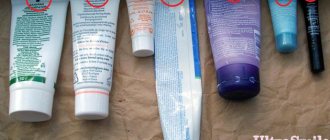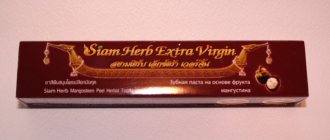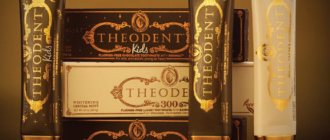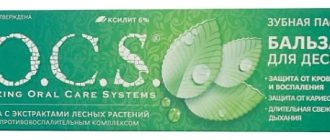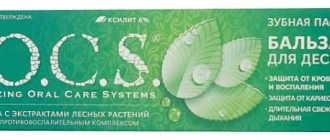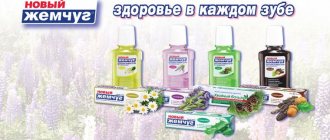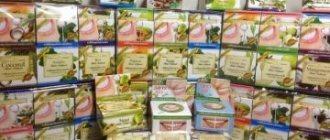There are so many different myths about what the colored stripes on toothpaste tubes mean. Allegedly, they are talking about harmful substances, the permitted frequency of using the paste, and what country or city it was actually made in. The most advanced manufacturers began to produce toothpastes in tubes with a green stripe, supporting the myth of their naturalness. But in fact, such assumptions are wrong, and any dentist can confirm this.
Basic myths about color marks on tubes
According to some consumers, the colors of the stripes on tubes of toothpastes, ointments and creams indicate the characteristics of their composition:
- Red is about synthetic.
- Green is about the environment.
- Blue and brown indicate that the product is half natural.
- Black - contains only chemical components.
Another part of consumers is of the opinion that colored markers indicate the degree of abrasiveness, the presence of protective properties, or the cost of hygiene products.
| Color of the strip on the paste tube | Number of abrasive particles | Protective properties | Price |
| Red | Few | Although it contains synthetic components, it provides the required degree of enamel protection. | Expensive product |
| Green | No | Effectively protects teeth and oral cavity from diseases thanks to its ecological composition | average cost |
| Blue, black, brown | A lot of | Has a low degree of protection, provokes periodontal disease | Cheap remedy |
Which toothpaste is the most natural?
We have selected reviews of the 10 most popular natural toothpastes.
- Toothpaste
Black… - tooth
powder “Calendula”…
OrganicMiracle Fluoride Free Whitening Toothpaste- Gel toothpaste
with vitamin B12 without fluoride... - Toothpaste
Fresh breath... - Complex natural toothpaste
Propoline.
GOST and multi-colored stripes
A modern tube of toothpaste made in Russia must comply with three GOST standards at once:
- GOST 7983-99 (based on ISO 11609-95) talks about the correct marking of a paste mass and what it means.
- GOST 14192 and 28303 indicate the requirements for containers.
These documents state that:
- It must be indicated on the tube:
- Product name;
- brand;
- trademark;
- volume;
- compound;
- acceptable storage conditions;
- best before date;
- availability of relevant certificates.
- The marking is applied in the language of the manufacturer and the importing country.
- Permissible deviations from weight are 5%.
- Containing materials must be environmentally friendly.
But none of the GOSTs talks about the meaning of colored stripes on toothpaste and the rules for applying them. That is, the state does not regulate in any way the procedure for applying a “color barcode” ; the company itself decides the issue of marking toothpaste with colored stripes and can do without these designations.
How to choose the right toothpaste for a child?
10 best children's toothpastes
- Splat Baby “Apple-Banana” – natural children’s toothpaste
- Kodomo "Orange" - inexpensive Japanese toothpaste
- Babycoccole “Apple Flavored” – a popular toothpaste
for baby teeth - Chicco strawberry flavor – natural toothpaste
- Lapikka “Milk pudding” – edible toothpaste
Interesting materials:
Who can be elected to local government bodies? Who can issue decrees on issues of citizenship of the Russian Federation? Who can bury? Who can be treated at the Ministry of Internal Affairs clinic? Who can fly to Switzerland from August 15? Who can purr? Who can go on parental leave? Who can inherit a donated apartment? Who can be appointed responsible for preparing a facility for gas hazardous work of hazard group I? Who can impose an administrative fine?
Why are multi-colored stripes applied?
In fact, the colored stripes on the tubes are an identification mark for the conveyor during automated production. They are necessary for high-quality separation of the tube blank from the conveyor belt.
Stripes on pastes
The technological sensor detects the color marking and cuts off the future tube of toothpaste. After this, the plastic sheet is twisted, glued and filled with gel content. After these manipulations, the tube is finally glued and closed with a cap.
The color of the mark on toothpaste, by and large, means nothing. The manufacturer can independently choose the range and height of the strips, regardless of the chemical composition of the product and the shape of the container.
Streaks on creams
Creams are marked as the products move along the conveyor belt in a non-contact manner using special color markers read by conveyor sensors. They allow you not only to correctly cut and solder the tube, but also indicate places for applying drawings and text on the container.
Information about the composition and manufacturer is applied by inkjet using special ink. That is, red, black and other stripes are needed only in the process of producing creams using robotic technology.
Environmental safety signs
Apple sign
This sign can be found on cosmetics that do not contain toxic or carcinogenic substances. Products with this mark have been tested by the international organization for the fight against cancer.
The icon is the letter “E” surrounded by a circle.
It is used to designate environmentally friendly products that do not contain hazardous ingredients, and its production does not have a negative impact on the environment. This sign is used in Russia.
The True Meaning of Flowers
Despite the simple explanation for the appearance of stripes on toothpaste tubes, a certain color is chosen for a reason. The choice of mark shade is influenced by:
- Tube color. A black (dark) stripe on the toothpaste means that the main tone of the blank and tube is white or just a light shade. Light marks are typical for dark-colored containers, but manufacturers who decide to choose this shade of marker take a risk, since the photo sensor may not “catch” it during the soldering process.
- Limited choice. Typically, the marking involves 4 basic shades (CMYK - Cyan Magenta Yellow Black). Additionally, a fifth color can be used to print a barcode, text, or one light mark.
That is, the correct reading of the marking by the optical sensor depends on the contrast of the stripe and the main color of the tube. Most often, the tags are darker than the background, which allows the sensors to read the necessary information most efficiently.
When choosing a marker shade, packaging design is no less important. This means that if there are blue elements on a tube of toothpaste, then the stripe on it will be blue. Since the stripes on tubes of creams and pastes do not mean anything important (impact on the enamel), they can easily be replaced by other design elements at the discretion of the manufacturer.
Technological photo marks can be divided into 2 types based on their position on the sheet:
- horizontal markers are placed for precise cutting of the main workpiece when printing on a rolled laminate;
- vertical marks are needed to accurately indicate the location of the cut when soldering the tube, so that it is parallel to the main text and image on the final product.
Sign in the form of a triangle of three arrows
This mark is applied to products that are made of plastic and can be industrially recycled. In the middle of the triangle there is a number, and at the bottom there is a letter designation of the material from which the packaging is made. This labeling of cosmetic products makes it easier to sort used containers for subsequent processing.
So, for example, if in the middle of the triangle there is the number 2, and below it the letters PE-HD, then this means the packaging is made of low-density polyethylene. This material is most often used for packaging shampoos and detergents. It is very recyclable.
What this sign means is clear to everyone. He encourages people to throw away packaging in places designated for garbage - trash cans, trash cans. It is a kind of incentive for people to keep the place where they live clean.
Labeling procedure
Color division depends on the equipment and the number of coloring sections. At the preparatory stage, one main color is taken, which will contrast most with the color of the tube. Based on it, the features of reading elements and printing a barcode are determined.
If you use two colors at once, for example, blue and black, this will lead to unreadable text when the equipment is moved. Optical sensors correctly capture one primary color (red, green). Most often, white color is used for the background, since all the colored stripes are clearly visible on white tubes; the height and width of the marks are discussed individually. This approach allows us to minimize the costs of producing and placing information on tubes using a printed, non-contact method.
But the color of the marking has nothing to do with the composition of the gel. Typically, the tubes are manufactured by a company that has nothing to do with the development of the personal care product itself and dentistry, so its labels simply by definition cannot refer to the chemical composition of the paste-like mass. If stripes on toothpaste mean anything, it clearly doesn't matter to the end consumer.
Depending on the required parameters of the tube, a large blank sheet is divided into parts of a certain size. Light marks are placed as delimiters. They indicate the location of the incision to produce a tube of the required volume. Different colors of markers help identify manufacturing defects and other technological defects.
The stripes on toothpaste do not mean anything, so you don’t need to look closely at them and look for a secret sign in them. If you need to choose a paste with some specific indicators, you should look for information about them not in strips. The content of synthetic and natural substances in the gel can be found by reading the composition information posted on the tube.
Ethical cosmetics signs
The issue of animal protection is now receiving a lot of attention.
As part of this work, the Ethical Cosmetics Standard was approved, its founder is the British Union (BUAV). The main concept of the standard is the inadmissibility of using animals for testing cosmetics, as well as the absence of components of animal origin in cosmetics. Thanks to special signs on the label or packaging of cosmetics, the consumer can find out whether the manufacturers of a particular type of product used ingredients that were tested on animals. By the way, in 2002, the EU countries adopted a ban on testing cosmetics; it came into force in 2009. Manufacturers of cosmetics, especially imported ones, indicate that their cosmetics have not been tested on animals; the buyer may see a symbol in the form of a cute bunny on the product.
CC cream
This product combines the properties of foundation and care cream. The name comes from color control. Although CC cream has fewer foundation pigments than BB cream, it contains more care ingredients. For example, vitamins, minerals, hyaluronic acid.
CC cream evens out tone, adapting to the natural shade of the skin, but does not mask serious imperfections. CC cream is a good option for the summer. If you have normal skin without flaws, then it is not a fact that the difference between BB and CC cream will be noticeable.
5 Acceptance rules
5.1 Cosmetic creams are accepted according to GOST 29188.0-91, section 1.
5.2 Sampling of cosmetic creams - according to GOST 29188.0-91, section 2.
Sampling to determine microbiological indicators - according to regulatory documents in force in the territory of the state that has adopted the standard.
5.3 To check the compliance of cosmetic creams with the requirements of this standard, acceptance and periodic tests are carried out.
5.4 Acceptance tests are carried out according to the following indicators: appearance, color, smell, pH value, dropping point and colloidal stability.
5.5 The procedure and frequency of monitoring for indicators: mass fraction of water and volatile substances, thermal stability, mass fraction of the amount of heavy metals and microbiological indicators is established by the manufacturer in the production control program.
Weight signs
Everything seems to be clear with these signs, but there are still several features that are worth paying attention to. If after writing the weight there is a Latin letter e, this means that the manufacturer indicated the volume or weight without packaging, that is, the sign corresponds to the inscription “Net weight”. If there is a sign on the packaging that indicates a figure with the volume or weight of the product, enclosed in a frame, then this indicates the volume or weight with packaging. Which corresponds to the inscription “Gross”.
European manufacturers may indicate volume in fluid ounces. Then there is such a sign on the label or packaging. To convert ounces to milliliters, simply multiply the number by 30.
6 Test methods
From the sample selected in accordance with GOST 29188.0-91, section 2, a combined sample is compiled, the mass of which must be at least 150 g. To determine microbiological parameters, the mass of the combined sample must be at least 15 g.
6.1 Definition of appearance
The appearance of cosmetic creams is determined according to GOST 29188.0-91, section 3.
6.2 Color definition
The color of cosmetic creams is determined according to GOST 29188.0-91, section 3.
6.3 Odor detection
The smell of cosmetic creams is determined according to GOST 29188.0-91, section 3.
6.4 Determination of mass fraction of water and volatile substances
The mass fraction of water and volatile substances is determined according to GOST 29188.4.
6.5 Determination of pH value
The pH value is determined according to GOST 29188.2 in a solution with a mass fraction of cream of 10%.
6.6 Determination of dropping point
The dropping point is determined according to GOST 29188.1.
6.7 Determination of colloidal stability
Colloidal stability is determined according to GOST 29188.3.
6.8 Determination of thermal stability
Thermal stability is determined according to GOST 29188.3.
6.9 Determination of the mass fraction of lead
The mass fraction of lead is determined according to GOST 26932 with sample preparation according to GOST 26929-94 (section 3 or 4) or according to regulatory documents in force in the territory of the state that has adopted the standard.
It is allowed to use the atomic absorption method in accordance with GOST 30178 or the stripping voltammetry method in accordance with regulatory documents in force in the territory of the state that has adopted the standard to determine the mass fraction of lead.
6.9a Determination of the mass fraction of arsenic
The mass fraction of arsenic is determined according to GOST 26930 with sample preparation according to GOST 26929-94 (section 3 or 4) or according to regulatory documents in force in the territory of the state that has adopted the standard.
It is allowed to use the stripping voltammetry method in accordance with GOST 31628 to determine the mass fraction of arsenic.
6.9b Determination of the mass fraction of mercury
The mass fraction of mercury is determined according to GOST 26927 with sample preparation according to GOST 26929-94 (section 3 or 4) or according to regulatory documents in force in the territory of the state that has adopted the standard.
6.10 Determination of microbiological parameters
— according to regulatory documents in force in the territory of the state that has adopted the standard.

